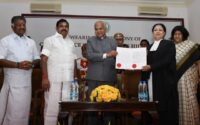WHETHER SUPREME COURT CAN INTERFERE IN THE PERSONAL LAWS?
Personal laws are laws that are governed by religious beliefs of India, which are applicable to citizens following that particular religion. The Supreme Court has agreed that these personal laws come within the term of “laws”
In the case of Narsingh Pratap Deo v. State of Orissa (i) , the Supreme Court stated that “though theorists may not find it easy to define a law” “the main features and characteristics of law are well recognized” and that “stated broadly, a law generally is a body of rules which have been laid down for determining legal rights and legal obligations which are recognized by courts.” Personal laws possess the above mentioned characteristics; hence they should come under the definition of the term “law”
In Krishna Singh v Mathura Ahir (ii) , the Supreme Court clearly stated that the part III of the constitution did not affect personal laws, as they were different from general laws and derived from ancient customs.
In Masilamani Mudaiar v Idol of Sri Swaminatha swami Thirukoil (iii), the Supreme Court held that personal laws, when they contravene the constitution, should be held void to the extent of that contravention. Uniform civil code is the proposition to supplant the individual laws in light of the sacred writings and traditions of every significant religious group in India with a typical set representing each resident. These laws are recognized from open law and spread marriage, divorce, legacy, selection and upkeep. Article 44 of the Directive Principles in India sets its usage as obligation of the State.
The first major case to focus attention on the issue was Mohammed Ahmed Khan vs Shah Bano Begum(iv). Here, a penurious Muslim woman claimed maintenance from her husband under Section 125 of the Code of Criminal Procedure, 1973 (“CrPC”), and was granted her claim. The then Chief Justice of India, Y.V. Chandrachud, came out strongly in favour of a uniform civil code, observing that, “A common civil code will help the cause of national integration by removing disparate loyalties to law which have conflicting ideologies.” A national furor erupted in the wake of this decision, prompting the incumbent Rajiv Gandhi government to overturn the decision by enacting the Muslim Women (Protection on Divorce) Act, 1985, which effectively barred Muslim women from claiming maintenance under Section 125. This move contradicted the observations of the Supreme Court and was justified on the grounds that mere observations of the Court did not obligate the other branches of government to actually implement such a uniform code.
In Sarla Mudgal vs. Union of India(v) , the Supreme Court revisited the matter. The issue in question was whether a Hindu man who embraced Islam could solemnize a second marriage as a Muslim. The Court held that in such a case, the first marriage would have to be dissolved under the Hindu Marriage Act, 1955. A simple conversion to Islam followed by marrying again would not amount to such dissolution. The man’s first marriage would therefore, still be valid and under Hindu law, his second marriage, solemnized after his conversion, would be illegal under Section 494 of the Indian Penal Code, 1860. Justice Kuldip Singh, delivering the judgment, remarked sharply that “the Rulers of the day are not in a mood to retrieve Article 44 from the cold storage where it is lying since 1949. The Governments – which have come and gone – have so far failed to make any effort towards “unified personal law for all Indians”. He went on to note that, “When more than 80% of the citizens have already been brought under the codified personal law there is no justification whatsoever to keep in abeyance, any more, the introduction of “uniform civil code” for all citizens in the territory of India.”
End Notes:
[i] AIR 1964 SC1793
[ii] AIR 1982 SC686
[iii] AIR 1996 SC 1697
[iv] AIR 1985 SC 945
[v] AIR 1995 SC 1531
BY:
Sewa Bishnoi
SLS, Hyderabad


